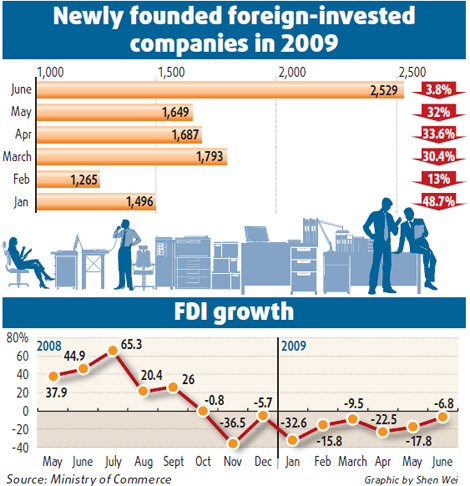
|
BIZCHINA> Editor Choice
 |
|
A new code of conduct
By Lu Haoting (China Daily)
Updated: 2009-09-07 08:05 A good example is a gradual phasing out of preferential policies toward foreign investors. Previously, tax waivers and incentives allowed foreign companies to pay an average 15 percent income tax versus a 33 percent rate for domestic companies. Since the beginning of 2008, corporate income tax rates for domestic and foreign companies are 25 percent. "Multinationals have to be aware that the days when their CEOs came and met top leaders are over. Today, it is more down to business," Wuttke said. Wuttke's views are shared by Seung Ho Park, president of the SKOLKOVO Institute for Emerging Market Studies, a think tank with offices in Beijing, Moscow and India that focuses on emerging markets. "In the past it was more like 'top-down' government guidance in foreign investment. But now the government can sit back and let the market take over," Park said. "If any foreign company wants to come to China, it has to bring the best technologies, because this is a highly competitive market," he said. "I don't think there is any unexpected change in the business environment for multinationals in China in the last couple of years. They could expect the rule of law is becoming mature in China and the consumer expectation is getting higher. China is becoming mature. This is a common situation multinationals would encounter in any country," Park said. Media's role Shortly after the Rio Tinto case was first reported, US label maker Avery Dennison's Asia Pacific Group entered the black list of bribery scandals. Its subsidiary, Avery China, reportedly had offered bribes to research institutions and government officials in return for business contracts. Although the scandal took place in China, the case was not investigated by the Chinese government. However, the scandal experienced wide media coverage in China. The source of their reporting was a litigation file published by the US Securities and Exchange Commission (SEC). Avery Dennison was compelled under US law to report the case to the SEC and the Justice Department. "Multinational companies are facing a tough media environment in China. Journalists, especially on the Internet, are quick to pick up any negative news against us," said a foreign business executive in Beijing, who declined to be named. In recent years negative news reports have mushroomed about product quality, commercial bribery, environmental negligence, unethical advertising and poor labor relations at big-name multinational companies. "The local media, especially via the Internet, are to some degree responsible for the hype of 'anti-multinational' sentiment," Park said. "China has the world's largest number of Internet users. They spread information and opinions," Park said. The situation is not unique to China, Park said, explaining that netizens in other countries also are quick to spread nationalistic sentiments.
Park said many foreign companies exploited a lack of rules and regulations in China and did things they would not do in advanced countries such as lowering quality or environmental protection standards. "China is coming up with excellent rules and laws. Some of the legislation is even tougher than Europe. But the size of the complexity of this economy is rising too fast, and the enforcement of these regulations lacks the right people. That has resulted in inconsistency in the implementation of the laws," said Wuttke of the European Union chamber in China. "The media should report more independently and help fill that gap," he said. Wuttke said it is not unusual for multinational companies that "put themselves up there" to attract criticism. "It is very easy for the government and other stakeholders to benchmark foreign companies so high because they talk green, talk clean and talk how they do internationally," Wuttke said. "They should make sure they work as they talk, not only in their own operations, but also in their joint ventures and licensees," he said.
 (For more biz stories, please visit Industries)
|